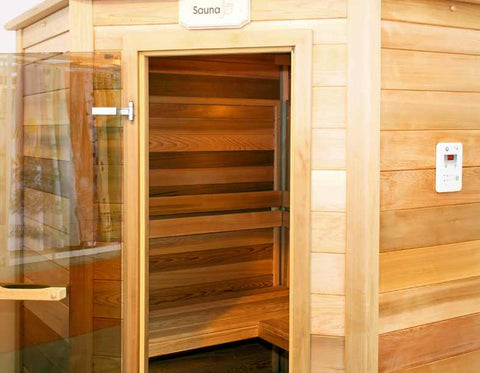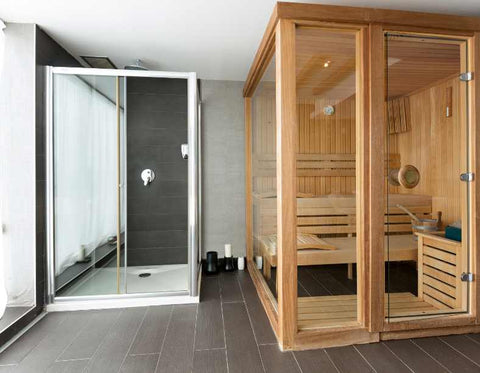Enhance Your Fitness Journey: The Potential Benefits of Sauna After Workout
Are you looking to take your fitness routine to the next level? The use of sauna sessions after workouts could unlock a host of potential health benefits. From enhanced muscle recovery to improved cardiovascular health, sauna heat therapy can complement your active lifestyle and help you reach your wellness goals.
But what exactly is a sauna, and how does it work its magic on the body? In this article, we'll dive deep into saunas, exploring their rich sauna history and the science behind their effects on the body. We'll also uncover the specific benefits that sauna use can offer after a workout, from boosting the immune system to reducing stress and promoting mental well-being.
To truly maximize the potential of sauna therapy, it's important to understand the best practices and safety precautions. We'll guide you through the dos and don'ts of sauna use, ensuring that you can enjoy the benefits while minimizing any risks.
We'll tackle some of the common myths and misconceptions surrounding saunas, separating fact from fiction, so you can approach your post workout sauna sessions with confidence and clarity.
Whether you're a seasoned fitness enthusiast or just starting your journey, understanding the potential of sauna use after workouts can be a game-changer.
So, let's dive in and discover how this ancient practice can enhance your modern fitness lifestyle.

What is a Sauna?
A sauna is a small room or house designed for experiencing dry or wet heat sessions, known to have profound effects on the body. Traditional saunas, originating from Finland, use wood to heat sauna rocks that, in turn, radiate heat into the enclosed space, often with humidity levels controlled by throwing water on the hot stones.
In contrast, modern saunas, such as infrared saunas, use infrared light to directly heat the body without significantly warming the surrounding air. Infrared sauna offers a different experience that some find more tolerable at lower sauna temperatures.
The Historical Significance of Saunas
Saunas hold a cherished place in various cultures, with a history that dates back thousands of years. In Finland, the sauna is more than a place for bathing. The traditional Finnish sauna is a sanctuary for physical and spiritual cleansing, deeply embedded in Finnish culture.
Across other parts of the world, such as in Russia with the Banya and in Turkey with the Hammam, the concept of a steam bath serves similar communal and ceremonial roles, emphasizing the sauna's significance in social and health practices across civilizations.
RELATED TO: Top 10 Best Saunas in the World for Ultimate Relaxation
Physiological Effects of Sauna on the Body

The high heat environment of a sauna bathing induces a number of physiological responses in the body that mimic the effects of moderate exercise: the heart rate increases, blood vessels dilate, and sweating occurs. This cardiovascular response can be beneficial post-workout, helping to maintain elevated heart rate and circulation.
Additionally, the sauna heat penetrates muscle tissue, aiding in relaxation and reducing tension, which can be particularly beneficial after strenuous physical activity.
Saunas and Detoxification
While the concept of detoxification through sweating in a steam sauna is widely debated, it's clear that sweating increases with sauna use. Sweating is one of the body's natural mechanisms for regulating temperature and eliminating certain toxins.
The increased perspiration experienced in a sauna can help flush out toxins absorbed from the environment, such as heavy metals like lead mercury, and other pollutants.
Saunas and Weight Loss
Sauna sessions can lead to temporary weight loss due to the loss of water weight from sweating. However, some studies suggest that regular sauna use can contribute to long-term weight management by improving insulin sensitivity, increasing growth hormone levels, and potentially influencing fat loss. It's important to note that these effects should be complemented with a healthy diet and regular exercise for significant weight management outcomes.
Understanding the traditional sauna experience and the science behind its use post-workout sets the stage for appreciating the potential sauna benefits it can offer as part of a comprehensive fitness and wellness regimen. These sections delve into both the experiential and physiological aspects of sauna use, providing a solid foundation for further exploration of its advantages.
Potential Health Benefits of Sauna Session After Workout

Enhanced Muscle Recovery
Using a sauna after a workout can significantly aid in muscle pain recovery. The heat from the sauna increases blood circulation, which helps in transporting essential nutrients and oxygen to tired muscles, facilitating faster recovery. This process helps in reducing muscle soreness and stiffness that often follow intense physical activity. Studies have shown that heat therapy can reduce delayed onset muscle soreness (DOMS) by promoting the repair of muscle tissues and reducing inflammation.
Improved Cardiovascular Health
Regular sauna use has been associated with various cardiovascular benefits. The heat induces a natural increase in heart rate, similar to moderate exercise, which can improve cardiovascular function over time.
Research, including longitudinal studies from Finland, suggests that regular sauna sessions can lower high blood pressure, enhance heart rate variability (HRV), and reduce the risk of cardiovascular diseases. This vasodilatory effect, where blood vessels widen, also aids in better blood flow, further supporting heart health.
Boosting Immune System
Exposure to the heat of a sauna can stimulate the production of white blood cells, which play a key role in defending the body against illnesses. The increase in body temperature can mimic a fever, a natural defense mechanism against infection, which in turn can strengthen the immune system. Regular sauna users often report fewer colds and flu, suggesting a link between sauna use and improved immune response.
Stress Reduction and Mental Health
Sauna sessions offer a tranquil retreat where the body can relax, and the mind can unwind from the stresses of daily life. The heat helps to relax muscles and relieve tension throughout the body, which can also potentially relieve mental stress and anxiety. Furthermore, the sauna can stimulate the release of endorphins, the body's natural feel-good chemicals, which can provide a calming and uplifting effect, contributing to better mental health and well-being.
How to Maximize the Benefits of Sauna After Workout

Best Practices for Sauna Use
To maximize the benefits of sauna use after workouts, it's important to know how to use sauna and follow some best practices:
-
Hydration: Ensure you're well-hydrated before entering the sauna and rehydrate after the session. The body loses a significant amount of fluids through sweat, and maintaining hydration is crucial.
-
Timing and Duration: Start with shorter sessions (around 5-10 minutes) and gradually increase the duration to 15-20 minutes as your body adapts. It's generally recommended to wait at least 10-15 minutes after exercising to allow the body to cool down slightly before entering the sauna.
-
Frequency: Incorporating sauna sessions 2-3 times a week after workouts can offer significant potential sauna benefits. Listening to your body is key; some may benefit from more frequent sessions, while others may require less.
Sauna Safety Tips
While sauna use is generally safe for healthy individuals, certain precautions should be taken to avoid risks such as overheating and dehydration:
-
Avoid Alcohol: Never use the sauna after consuming alcohol, as it can increase the risk of dehydration, hypotension, and arrhythmias.
-
Monitor Time: Limit sauna sessions to a maximum of 20 minutes at a time to prevent overheating.
-
Cool Down Gradually: After exiting the sauna, allow your body to cool down gradually. Avoid jumping into a cold pool immediately after, as the sudden temperature change can be a shock to the system.
-
Consult Healthcare Providers: Individuals with cardiovascular conditions, pregnant women, or those with any other significant health issues should consult with a healthcare provider before incorporating sauna use into their routine.
By understanding and applying these key benefits and maximization strategies, individuals can safely incorporate sauna sessions into their post-workout regimen to enhance physical recovery, cardiovascular health, immune function, and mental well-being.
Addressing Common Myths and Misconceptions

The use of saunas, particularly after workouts, is surrounded by various myths and misconceptions. Addressing these can help clarify the potential sauna health benefits and safe practices of sauna use.
Myth 1: Saunas Burn a Lot of Calories
One of the most prevalent myths is that sitting in a sauna can burn a significant number of calories, akin to a high-intensity workout. While the body does expend more energy in the sauna due to increased heart rate and the body's efforts to cool itself, the calorie burn is relatively small. Most of the weight loss experienced immediately after a sauna session is due to water loss through sweating, not fat loss. It's crucial to rehydrate after using the sauna to replenish lost fluids.
Myth 2: Saunas are Detrimental to Hydration and Electrolyte Balance
Another common misconception is that sauna use, especially after exercise, can lead to severe dehydration and electrolyte imbalance. While it's true that sauna use increases sweating and can contribute to fluid loss, this can be easily managed by proper hydration. Drinking water before, during (if possible), and after sauna use can maintain hydration levels. If using the sauna for extended periods or if the session is particularly intense, it might also be beneficial to replenish electrolytes with a balanced electrolyte drink.
Myth 3: Saunas Can Replace Cardio Workouts
Some believe that the elevated heart rate experienced in the sauna can substitute for cardiovascular exercise. However, while the sauna does induce a cardiovascular response, it does not provide the same benefits as aerobic exercise, such as improved endurance, heart muscle strength, or the myriad of metabolic and psychological benefits associated with physical activity. Saunas can complement a well-rounded fitness routine but should not replace active cardio workouts.
Myth 4: Traditional and Infrared Saunas are Safe and Beneficial for Everyone
While saunas are safe for most people when used correctly, they are not suitable for everyone. Individuals with certain medical conditions, such as uncontrolled high blood pressure, or heart disease, or those who are pregnant, should consult a healthcare provider before using a sauna. It's also imperative to listen to your body and exit the sauna if you feel dizzy, lightheaded, or uncomfortable at any point of the sauna session.
Myth 5: More Sweat Means More Toxins are Released
The idea that heavy sweating in a sauna leads to significant detoxification by expelling toxins is another widespread misconception. While the body excrete small amounts of toxins through sweat, the primary organs responsible for detoxification are the liver and kidneys. Saunas can help cleanse the skin and pores but are not a substitute for the body's natural detoxification processes.

How long should I stay in the sauna after a workout?
It's recommended to start with shorter sauna sessions of around 5-10 minutes, especially if you're new to sauna use. As your body becomes accustomed to the heat, you can gradually increase the duration to 15-20 minutes. It's imperative to listen to your body and exit the sauna if you feel dizzy, overly tired, or uncomfortable at any point.
Is it better to use a sauna before or after exercise?
Using a sauna after a workout is generally considered more beneficial. Post-exercise sauna sessions can relieve post workout muscle soreness, help relax the body, and enhance the detoxification process through sweating. Using the sauna before working out might lead to muscle relaxation that could potentially increase the risk of injury during exercise.
Can using a sauna improve my skin?
Yes, sauna use can have positive effects on your skin. The heat and sweating can help open up pores and flush out impurities, leading to cleaner and clearer skin. Additionally, increased blood circulation can promote healthier skin by delivering more nutrients and oxygen to the skin's surface.
Should I drink water while in the sauna?
It's essential to hydrate before and after using the sauna, but drinking water while in the sauna is a personal choice and depends on the length of your session and how your body responds to the heat. For longer sessions, it might be beneficial to take a water bottle with you to avoid dehydration.
Can sauna use help with weight loss?
While sauna sessions can lead to temporary weight loss due to water loss from sweating, they should not be relied upon for significant or long-term weight loss. The calorie burn during a sauna session is relatively low compared to traditional exercise. Sauna post workout can be a beneficial addition to a weight loss program that includes regular exercise and a healthy diet but should not be used as a primary method for losing weight.
How often can I safely use the sauna?
Most people can safely use the sauna 2-3 times a week after workouts. However, some individuals may enjoy daily sauna sessions without any adverse effects. The key is to listen to your body and adjust your sauna usage based on how you feel. If you have any health conditions, consult with a healthcare provider for personalized advice.
Are there any risks associated with sauna use?
Sauna use is safe for most people when practiced responsibly. However, risks such as overheating, dehydration, and heat stroke can occur if you stay in too long, don't hydrate adequately, or use the steam rooms at too high a temperature. Individuals with certain health conditions, such as cardiovascular diseases, should seek medical advice before using a sauna.

In Summary
Adding sauna sessions into your post-workout routine can offer many potential benefits for your physical and mental well-being. From enhanced muscle recovery and improved cardiovascular health to boosting your immune system and stress relief, the heat therapy provided by saunas can be a powerful tool in your fitness journey.
By understanding the best practices for sauna use, such as proper hydration, timing, duration, and frequency, you can safely and effectively maximize the potential benefits. It's also imperative to be aware of the safety precautions and to listen to your body.
While there are many myths and misconceptions surrounding sauna use, it's important to approach this practice with accurate information and realistic expectations. Saunas are an excellent addition to a well-rounded fitness routine, but they should not be viewed as a substitute for regular exercise or a quick fix for weight loss.
As you step out of the sauna, refreshed and rejuvenated, you'll be taking a step towards a healthier, more balanced lifestyle. So, whether you're a seasoned athlete or a fitness newcomer, consider unlocking the potential benefits of sauna use after your workouts – your mind and body will thank you.
